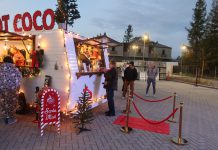Call him a community organizer, a leader who can “reach across
the aisle.” New Sonoma County Farm Bureau president Joe Pozzi is
the sort of man who is equally comfortable sitting down at a table
full of bookish resource conservationists, or standing around a
barbecue surrounded by born-and-bred cattlemen.
Pozzi, as is often expected of a Farm Bureau president, is
himself a rancher—raising sheep and Angus cattle in West County.
But he’s also a direct marketer, the owner of the innovative
company Pure Grow Wool, a developer of sustainability guidelines,
and the district manager for Gold Ridge Resource Conservation
District.
“I’m interested in working landscapes and resource conservation
on properties,” Pozzi said. “There’s nothing more beautiful than
driving through open spaces that are productive… the land was
always meant to be grazed.”
He hopes to convince the community that agriculture and
conservation are not mutually exclusive—and are, in fact, often
synonymous.
“People who are in agriculture are conservationists,” Pozzi
said, noting that if a farmer doesn’t preserve and protect the
land, he threatens the future of his own business.
“The concept that we don’t take care of our land is false. You
can go to ranch after ranch and see the conservation on the
properties,” Pozzi said. “We are good stewards of the land.”
Another commonly held tenet that Pozzi hopes to prove false: the
idea that the Farm Bureau is only for growers with hundreds of
acres of land. He hopes to reach out to all sorts of farmers, from
large-scale ranchers to small-scale diversified operations.
“I’m excited to be the president and I’m looking forward to
bringing all facets of agriculture together. If you own one acre or
1,000 acres in this county, you should be a member of Farm Bureau
because it gives you representation of land use issues. We all need
to be at the table at the same time to protect those rights,” Pozzi
said.
In his own businesses, Pure Grow Wool and Pozzi Ranch Lamb,
Pozzi has demonstrated that farmers can police themselves and even
benefit from following sustainable practices.
He developed a set of guidelines for the ranchers he works with,
in order to ensure the purity of his lamb and wool products—and
enhance their marketability.
“We’re making sure the quality of the product is high, and we’re
taking care of the land,” Pozzi said.
Pozzi’s personal certification will soon be backed by a
market-driven system developed by Whole Foods Market. Since
receiving criticism for falsely advertised pastured meat products,
Whole Foods Market has come up with its own set of national
guidelines to support livestock welfare. The program, called ‘The
5-Step Animal Welfare Rating,’ has already been released for pigs,
chicken, and cattle.
The guidelines for lamb will be released in Fall, and Pozzi’s
lamb is expected to satisfy four out of the five possible levels,
which requires that the animal’s life be pasture-based and treated
humanely (no physical alterations). The fifth level typically
requires that animals spend their entire lives on one farm, but
many local ranchers move their animals to different pastures miles
away in order to feed them grass year-round.
Why go through all the trouble to ensure his customers receive
environmentally-friendly, happy-sheep meat? Pozzi hopes to
distinguish his product from global meat, and in doing so expand
the local food system.
“There’s more work to be done to educate the consumer, to say we
have to have a food source that’s secure,” he said. “Worldwide, we
have food at our fingertips, but we don’t really protect our local
growers.”
Sometimes, he sounds more like an environmentalist than a
farmer—and his point, of course, is that he’s both.
“I fear that in future generations, food is going to be like
oil,” Pozzi said. “We need to protect agriculture for future
generations. There’s more we could do to promote food locally.”
Staff Writer Lynda Hopkins can be reached at Ly***@*****ib.com.







